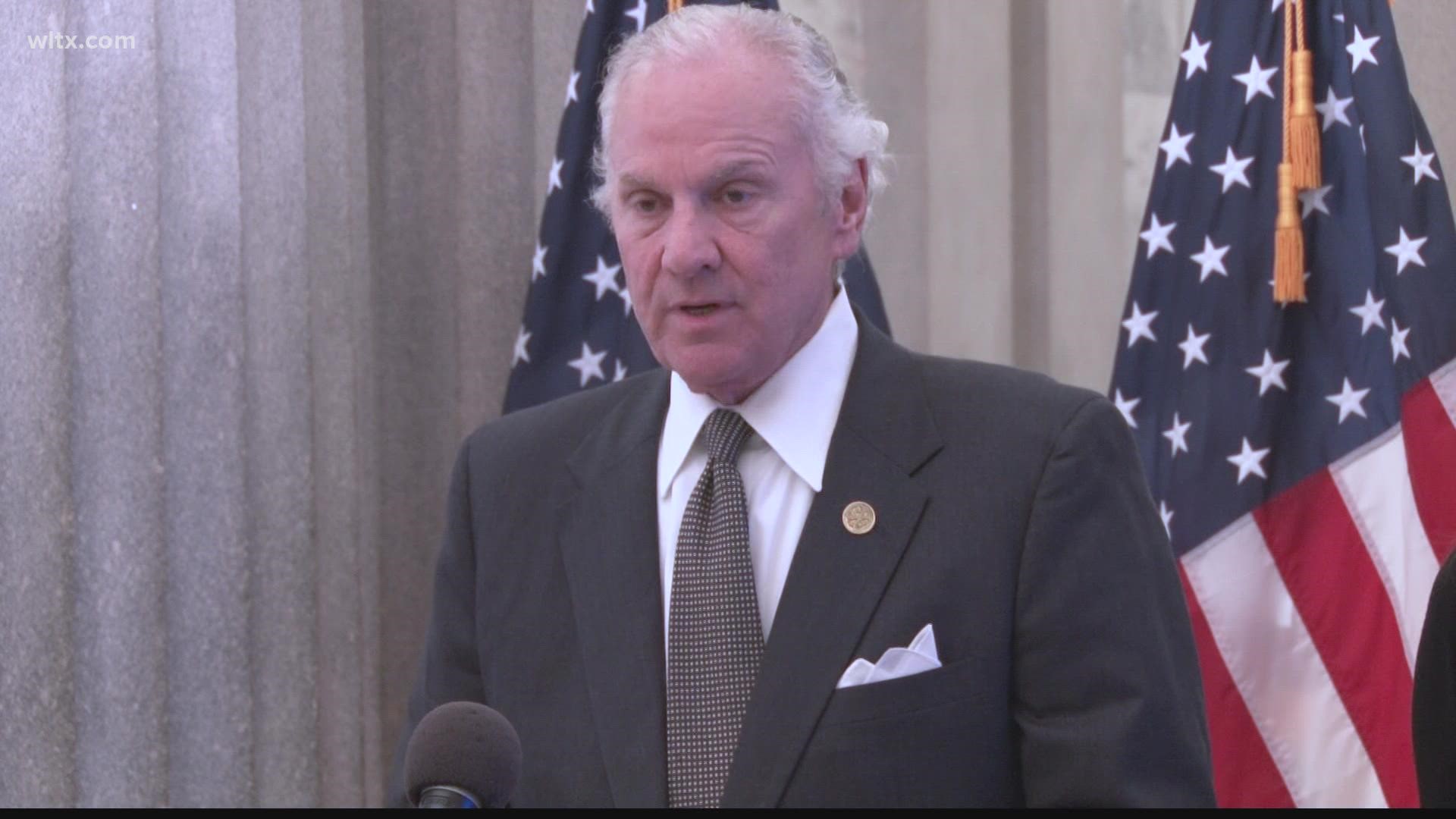COLUMBIA, S.C. — On Monday, South Carolina Governor Henry McMaster unveiled his proposed budget for the 2022-2023 fiscal year. The budget includes more than two-billion dollars.
"Today, South Carolina’s state government is in the strongest fiscal condition in memory," Gov. McMaster said. "The $2.4 billion in ARPA [American Rescue Plan Act of 2021] funds along with the almost $3 billion in surplus revenue generated by South Carolina’s booming economy presents us with a once-in-a-lifetime opportunity, an opportunity that we cannot afford to squander."
The proposed executive budget includes more than $200 million to improve the state's roads and bridges and an allocation to rainy day funds for any economic uncertainties.
"If we take advantage of this once-in-a-lifetime opportunity by making big, bold, and transformative investments in the areas of education, infrastructure, workforce, and economic development, South Carolina will prosper for generations to come," McMaster said.
This would be the second year in a row the governor places $500 million into the state's rainy day reserve fund. The governor also proposed allocating more than a $200 million to improve education for K-12 and higher education, including raising the teacher minimum wage.
"My executive budget increases the state minimum teacher salary schedule by $2,000," Gov. McMaster said. "Consequently, the minimum starting salary of a teacher will be increased from $36,000 to $38,000. It’s important to remember that just five years ago, the minimum starting salary of a teacher in South Carolina was $30,113."
To combat the school bus driver shortage caused by the pandemic, the governor is also proposed allocating more than $10 million to provide bonuses to new and current drivers.
"Competent, reliable school bus drivers are essential to our children’s safety and education," Gov. McMaster said. "To recruit and retain school bus drivers in our state, I am proposing that $12 million in non-recurring funds be appropriated to provide a one-time bonus of $2,000 for each school bus driver for the 2022-23 school year. The $2,000 bonus should be paid in three separate payments, awarded in August 2022, December 2022, and at the end of the school year in 2023."
RELATED: Midlands in desperate need for bus drivers as some students wait nearly an hour at bus stops
Governor McMaster also is proposing a 1% tax reduction on personal income tax brackets, "especially with our neighboring state of Georgia and North Carolina, both of which have lowered their income tax rate well below South Carolina’s 7% rate," the Governor said.
"This year marks the fourth year that my executive budget proposes a 1% rate reduction over five years for all personal income tax brackets, starting with an immediate $177 million cut," McMaster said.
Bob Morgan, president of the South Carolina Chamber of Commerce, said the state is in need of a tax break and reform.
"We are out of sync with other states around us," Morgan said. "Our personal income tax rate is the highest in the Southeast, one of the highest in the country."
Morgan said this is an opportunity to return dollars back to taxpayers, who help fund the state government.
Governor McMaster also shared his recommendations on how the state should use the $2.4B funds from the American Rescue Plan Act (ARPA) to help fix infrastructure in rural and low-income communities.
"In rural South Carolina, water and sewer is key to life," Gov. McMaster said. "The state's rural water, sewer and storm water infrastructure is becoming old and outdated. According to the State Rural Infrastructure Authority (RIA), the average age of a water and sewer system in our state is 47-50 years old. I have proposed that the RIA administer $500 million in ARPA funds and prioritize the distribution of grants for water, sewer, and storm water to systems in the state’s poorest counties."
Governor McMaster is also requesting to use ARPA funds to expand broadband access.
"I ask that the General Assembly appropriate up to $400 million for additional broadband expansion, $300 million from ARPA funds and $100 million from the federal Infrastructure Investment and Jobs Act (IIJA) and that it be deployed in a manner consistent with the State’s Broadband Infrastructure Program," the Governor explained.
Governor McMaster is also asking the General Assembly set aside $250 million in ARPA funds to replenish the Unemployment Insurance Trust Fund in case of an economic downfall and devastation.
"Small businesses in South Carolina have borne the brunt of the financial impact of the COVID-19 pandemic, especially those in the hospitality and service industry," Governor McMaster said." In 2020, the State directed close to $1 billion in CARES Act funds to replenish the Unemployment Insurance Trust Fund, which had been depleted by COVID-19 related job loss claims. This prevented small businesses in South Carolina from bearing an increase in the unemployment insurance tax premiums, which have not been increased in almost a decade."
While on the topic of the COVID-19 pandemic, the governor said the SC Department of Health and Environmental Control (DHEC) agency is asking for funds to expand and continue to help serve the community during these uncertain times.
"DHEC is requesting $100 million in ARPA funds be appropriated by the General Assembly for the construction of a new public health laboratory and anticipates a new facility will have a useful lifespan of 40 years into the future."
To see the full breakdown of the governors Executive Budget and recommendations for ARPA plans, CLICK HERE.
All the proposals will have to be approved by the legislature when they returned to session. Lawmakers could make changes to them, or reject them altogether.

